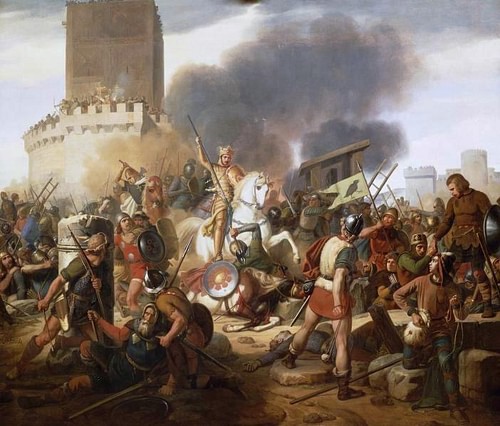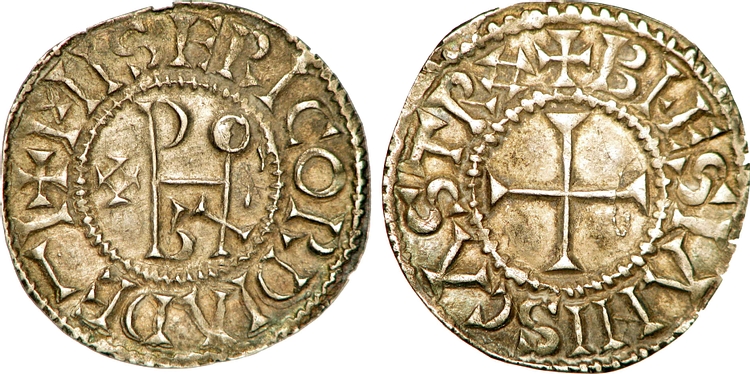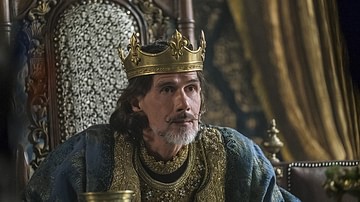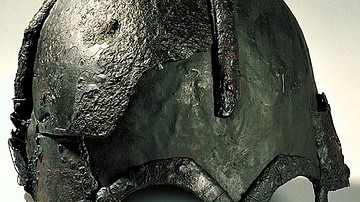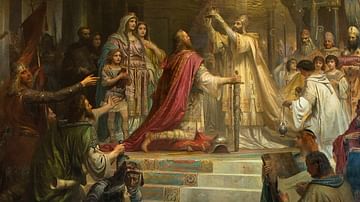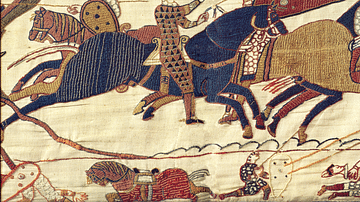
Odo of West Francia (also known as Eudes, l. c. 856-898 CE, r. 888-898 CE) was Count of Paris and hero of the Viking Siege of Paris 885-886 CE who was shortly afterwards elected King of West Francia. He was the son of Robert The Strong (c.830-866 CE) Count of Anjou, Duke of the Franks, Marquis of Neustria and the older brother of Robert I (r.922-923 CE) who deposed Charles the Simple (r.893-923 CE) as King of West Francia. Odo is considered an effective, if embattled, monarch but is best known for the role he played in the defense of Paris.
He was the first non-Carolingian monarch of West Francia and held the throne for ten years while defending his reign from Frankish nobles who supported Charles the Simple as king. Odo successfully maintained his rule, even though he was forced to cede more and more authority to Charles and his supporters, and died in 898 CE as the king.
Background & Rise to Power
Robert the Strong was a member of the Robertian family line, ancestors of the House of Capet, who would rule the Kingdom of France beginning in 987 CE. The Robertians were originally an East Francia family but migrated to West Francia shortly after the Treaty of Verdun of 843 CE which partitioned the region. They were rewarded by king Charles the Bald of West Francia (r. 843-877 CE) with land and titles in the region of Neustria for defecting from Charles' brother Louis the German of East Francia (r. 843-876 CE). Charles' favors elevated the status of the family and secured their fortunes in the region.
Between 858-861 CE, Robert rebelled against Charles when the king gave his son Louis the Stammerer (r. 877-879 CE) the title King of Neustria; an elevation in status which naturally decreased Robert's own. Charles and Robert were reconciled in 861 CE and Robert was tasked with defending Neustria from Viking attacks. Robert alternately fought with Salomon, Duke of Brittany (r. 857-874 CE) over land rights or allied with him against Viking incursions. In 866 CE, at the Battle of Brissarthe, Robert was killed in a sudden Viking counter-attack, leaving behind two sons, Odo and Robert I.
Nothing is known of Odo's life prior to his father's death. When Robert died, Odo was only seven years old so, even though he officially inherited his father's title as Marquis of Neustria, he was too young to wield it. The title was transferred by Charles the Bald to Hugh the Abbot (d. c. 886 CE), Odo's older step-brother, who was appointed regent over the two boys.
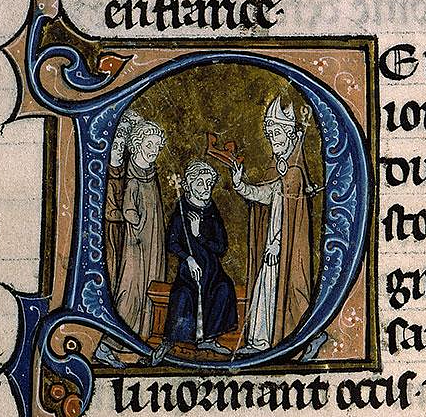
No records exist concerning Odo between 866 CE and 882/883 CE when he married Theodrate of Troyes (c. 868-903 CE) with whom he is said to have had two children (both of whom died young). In c. 882 he was given the title Count of Paris by Carloman II (r. 879-884 CE). Carloman II died in 884 CE without an heir and the nobles of West Francia invited Charles the Fat of East Francia (r. 884-887 CE), the youngest son of Louis the German, to rule. Charles maintained all the titles given by Carloman II and Odo continued as Count of Paris. His responsibilities included administration of the city and the surrounding area and defense of his district when necessary; especially defense against Viking attacks.
The Siege of Paris
Viking raids in West Francia had been destabilizing the region since 841 CE when the Viking chief Asgeir sacked and burned Rouen. In 845 CE the Norse chieftain Reginherus lay siege to Paris, took the city, and had to be paid by Charles the Bald to leave. This payment set a precedent which would be followed by later kings to leaders of Viking raids. West Francia became an easy source of income for the Scandinavian raiders between 845-876 CE since, even if there was nothing of value to be taken, they could simply harass the region until a king paid them to stop. These raids continued until, in 885 CE, an enormous fleet of 700 Viking ships appeared on the Seine converging on Paris and Odo had to move quickly to defend it.
The monk Abbo of St. Germain des Pres (9th century CE) describes the Viking fleet as so vast that “one might ask in astonishment in what cavern the river had been swallowed up, for nothing was visible there, since ships covered that river as if with oak trees, elms, and alders” (Somerville & McDonald, 222). The fleet put to anchor below the high walls of Paris and, on the second day, their leader was allowed entrance to discuss terms. Abbo writes:
Sigfried, who was then king only in name but who was in command of the expedition, came to the dwelling of the illustrious bishop. He bowed his head and said, “Gauzelin, have compassion on yourself and on your flock. We beseech you to listen to us in order that you may escape death. Allow us only the freedom of the city. We will do no harm and we will see to it that whatever belongs either to you or to Odo shall be strictly respected.” (Somerville & McDonald, 222)
Odo seems to have been present at this meeting although Abbo only records the conversation between the bishop and the Viking chief. The bishop replied to Sigfried:
“Paris has been entrusted to us by the Emperor Charles who, after God, king and lord of the powerful, rules over almost all the world. He has put it in our care, not at all that the kingdom may be ruined by our misconduct, but that he may keep it and be assured of its peace. If, like us, you had been given the duty of defending these walls, and if you should have done that which you ask us to do, what treatment do you think you would deserve?” Sigfried replied, “I should deserve that my head be cut off and thrown to the dogs. Nevertheless, if you do not listen to my demand, on the morrow our war machines will destroy you with poisoned arrows. You will be the prey of famine and of pestilence and these evils will renew themselves perpetually every year.” So saying, he departed and gathered together his comrades. (Somerville & McDonald, 222).
At some point after the 845 CE raid by Reginherus a low, fortified bridge had been built across the Seine to deter any future Viking attacks and a tall tower raised against the outer walls of the island-city of Paris. After Sigfried left the meeting, Odo arranged for the defense of the city but it seems he did not expect an attack as early as the next morning since Abbo's account suggests the city was surprised:
In the morning, the Northmen approached the tower and attacked it. They shook it with their engines and stormed it with arrows. The city resounded with clamor, the people were aroused, the bridges trembled. All came together to defend the tower. There Odo, his brother Robert, and the Count Ragenar distinguished themselves for bravery; likewise, the courageous Abbot Ebolus, the nephew of the bishop. A keen arrow wounded the prelate, while at his side the young warrior Frederick was struck by a sword. Frederick died, but the old man, thanks to God, survived. For many this was their last moment of life, but they inflicted bitter blows on many of the enemy. At last the enemy withdrew, carrying off a vast number of Danish dead. (Somerville & McDonald 222-223)
The Parisians spent the night repairing the tower with wood and were able to even make it a little higher than it had been before. The next morning, the Vikings attacked again in a more focused and concerted assault. The tower seemed about to fall when Odo rallied the troops:
The warriors rushed together to defend the tottering tower and to repel the fierce assault. Among these warriors, two, a count and an abbot [Ebolus], surpassed all the rest in courage. The former was the redoubtable Odo who never experienced defeat and who continually revived the spirits of the worn-out defenders. He ran along the ramparts and hurled back the enemy. On those who were secreting themselves so as to undermine the tower he poured oil, wax, and pitch, which, being mixed and heated, burned the Danes and tore off their scalps. Some of them died; others threw themselves into the river to escape the awful substance. (Somerville & McDonald, 223)
The Vikings were again driven back to their ships but they were determined to take the city and so a siege began. As the months wore on, Paris suffered from lack of food and also disease which “brought death to many noble men. Within the walls there was not ground in which to bury the dead” (Somerville & McDonald, 223). The people chose Odo to ride to King Charles the Fat and ask him for help. In order to do this, Odo had to break out of the city, cross the bridge – which was held by the Vikings – and evade capture in the Viking-held territory on the other side.
There are no details given on how Odo managed to do this or how long he was away but, at some point in 886 CE, he returned with the armies of Charles the Fat. He fought his way through the Viking forces and into the city with his men; the Vikings in quick pursuit. Odo organized an immediate defense and the Danes were again driven back to their ships. Charles the Fat and his army remained in position on the far side of the river.
It is clear that Odo now expected Charles the Fat to order his troops into battle but the king did no such thing. Instead, he called for negotiations with the Viking chiefs and offered them a substantial sum to leave Paris alone and go raid Burgundy; an offer the Vikings accepted. Charles had ended the siege, as Odo had hoped, but not in any acceptable manner. In 887/888 CE, Charles was deposed and Odo elected King of West Francia, taking the throne in 888 CE.
King Odo & Charles the Simple
Hugh the Abbot had died in 886 CE, and the title Marquis of Neustria was returned to Odo who added it to his title of Count of Paris and then King of West Francia. As noted, Odo was the first king since West Francia's founding who was not a Carolingian. Although he was the undisputed hero of the Siege of Paris, his service to the city was fairly quickly forgotten by the nobles who wanted to re-establish the Carolingian line through Charles the Bald's grandson Charles the Simple.
Charles was only six-years-old in 885 CE but by 890 CE, when he was eleven, he was considered old enough to be crowned. Odo, during these years, was kept busy with Viking raids and administrative duties and it is unclear whether he was aware that the nobles were seeking to replace him with Charles. This seems to have only become apparent to him after 890 CE, and painfully so, when Charles was crowned king in 893 CE.
The nobles pressured Odo to abdicate in Charles' favor but Odo refused. He appealed to King Arnulf of East Francia (r. 887-899 CE), to whom he had paid homage since becoming king, to support his cause. Odo had every right to expect Arnulf to take his side. Arnulf had overthrown Charles the Fat in 887 CE after Charles returned from settling the Paris siege and he and Odo seem to have had the same opinion of Charles and his methods of rule. Further, Odo had supported Arnulf in his coup and maintained good relations with him afterwards. Arnulf, however, was persuaded by the West Francia nobles to decide for Charles the Simple on the grounds that Charles was the rightful king and Odo merely a place-holder until the young prince was old enough to rule.
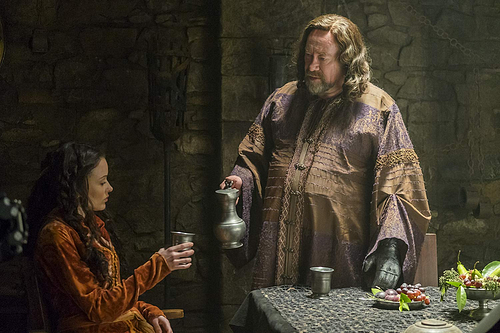
Odo resisted the nobles from 893 CE until his death in 898 CE. He steadily lost power in West Francia but refused to concede what he considered his hard-won right to wear the crown. Although Charles had been king since 893 CE, he had no real power until Odo's death, taking the throne at the age of 19. Charles inherited Odo's Viking problem and struggled with it for the next 13 years of his reign until he hit upon a solution: he offered the Viking chief Rollo lands in West Francia and the hand of his daughter Gisla in marriage in exchange for fealty and protection from future Viking raids. Rollo accepted the offer and became the founder of Normandy (the land of the Norsemen) in 911 CE.
Odo in Vikings & Legacy
In the TV series Vikings, the role of Odo, Count of Paris is played by the actor Owen Roe in Seasons 3 and 4. Odo is depicted accurately only in his role as defender of Paris. There is no evidence he had a lurid sexual relationship with a noblewoman named Therese nor any that such a woman (or her brother in the show, Roland) existed. The plan Odo reveals to Therese in Season 4 to kill King Charles and take the throne is complete fiction but draws on the historical tension between Odo and supporters of Charles the Simple c. 893-898 CE. According to the historical accounts of Odo, such as Abbo's, he was a brave and honorable man who did his best for his city and, later, his country.
The reign of Charles the Simple was challenged by Odo's younger brother Robert I in c. 922 CE and he was deposed following the Battle of Soissons in 923 CE. Robert was killed in the battle and the throne of West Francia went to his son-in-law Rudolph, Count of Burgundy and Troyes, who was then succeeded by later kings leading to the reign of Hugh Capet (r. 987-996), founder of the Kingdom of France. This kingdom would later evolve into the modern nation with its capital at Paris.
Although no one can tell what the fate of Paris would have been if the Vikings had won the siege of 885-886 CE, it is certain that its development would have taken a different course. Historical precedent for the Vikings destroying cities that fell to them – and especially those that resisted them - is plentiful, most notably (as far as West Francia is concerned) the city of Rouen, sacked and burned in 841 CE by Asgeir. Count Odo's defense of the city saved Paris and, although this seems to have been quickly forgotten by the nobles of his time, this is his greatest legacy.
